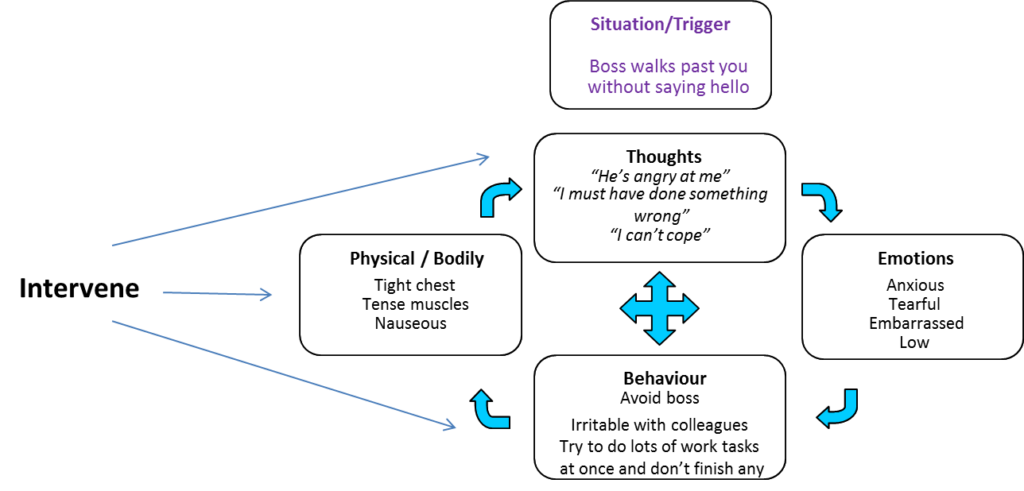What are the basic principles of Cognitive Behavioural Therapy – and how might it help you? Brisbane Psychologist, Dr Anna Woodall has prepared this brief guide to CBT to answer your questions …
Cognitive Behavioural Therapy (CBT) is a form of psychotherapy that alleviates distress, by examining how someone’s thoughts, feelings and behaviours influence each other.
It is an active form of therapy in which both the client and the therapist should be motivated to work together, to understand the client’s emotional patterns. Practising skills and agreed activities between sessions is essential to its effectiveness.
Identifying and Addressing Unhelpful Thinking Patterns
A key feature of CBT is identifying unhelpful thinking patterns.
Unhelpful thinking patterns often occur prior to, and during, times of high emotion or distress. Below is a simple example of how CBT might identify any unhelpful thinking patterns that could be interacting with your mood:
Situation: You had planned to meet your friend at the cinema at 7pm but they have just phoned to say they’re running an hour late.
Different people will respond differently.
Person 1, for example, who is feeling depressed, thinks: “They don’t like me”; “No one wants to spend time with me”; “I’m a boring person.” They feel saddened and low.
Meanwhile Person 2, who is feeling anxious, is thinking: “What if she is seriously ill?”; “I have to travel back on my own – what if I get mugged?”. Person 2 feels highly anxious and worried.
Person 3 on the other hand, thinks: “This is typical – my friends are always late!”; “They don’t care”; “People are so inconsiderate!”; “I can’t believe she didn’t leave on time!!”. This person feels very angry and annoyed.
Remembering that thoughts are not facts, and starting to curiously question them is a useful strategy; asking ‘Am I jumping to conclusions or catastrophizing?’ can often be a good starting point. Click the link for more information on unhelpful thinking habits: https://www.getselfhelp.co.uk/docs/UnhelpfulThinkingHabitsWithAlternatives.pdf
CBT is also interested in identifying how our behaviour drives and reinforces certain feelings and thought processes. As a consequence of our mood we might find ourselves behaving in a way that creates vicious cycles of unhelpful thoughts, feelings and behaviour. These cycles can occur in a range of mood disorders including anxiety and depression.
Below is an example of how CBT might represent one such vicious cycle and where you and your therapist might develop interventions to disrupt the cycle:
Examples of interventions that you might develop and practice with your therapist include:
- Strategies targeting your thoughts by raising awareness of them and using Thought Challenging.
- Strategies targeting your physical sensations by using Relaxation Techniques.
- Strategies targeting your behaviour through Problem Solving or graded management to face your fears.
Could CBT Be Right for You?
CBT has become an umbrella term for a wide range of treatment protocols that have been developed for various disorders (eg stress and depression, panic disorder, generalised anxiety disorder, social anxiety, and obsessive compulsive disorder). When you and your therapist tailor the approach to your disorder, and individual experience, it can be very useful.
If you are keen to identify problematic patterns, develop strategies, and practise new skills with the support of a therapist then CBT might be a useful approach for you.
While it can be hugely beneficial it might not be the right approach for everyone given their particular difficulties and experiences. Some people can find aspects of CBT helpful to give them strategies to manage their symptoms, but continue to report rigid thinking and patterns of behaviour that are difficult to change. If that’s the case a different approach (eg Acceptance and Commitment Therapy or Schema Therapy) might be more suitable.
The approach taken should be discussed and agreed with your therapist.
 Author: Dr Anna Woodall, B Psych (Hons), D Psych (Clinical), MAPS.
Author: Dr Anna Woodall, B Psych (Hons), D Psych (Clinical), MAPS.
Dr Anna Woodall has a Doctorate in Clinical Psychology from the University of East London, and over 10 years of experience delivering psychological support and mental health research in Australia and the United Kingdom.
Dr Woodall is currently on extended leave
To make an appointment try Online Booking. Alternatively, you can call Vision Psychology Brisbane on (07) 3088 5422..

